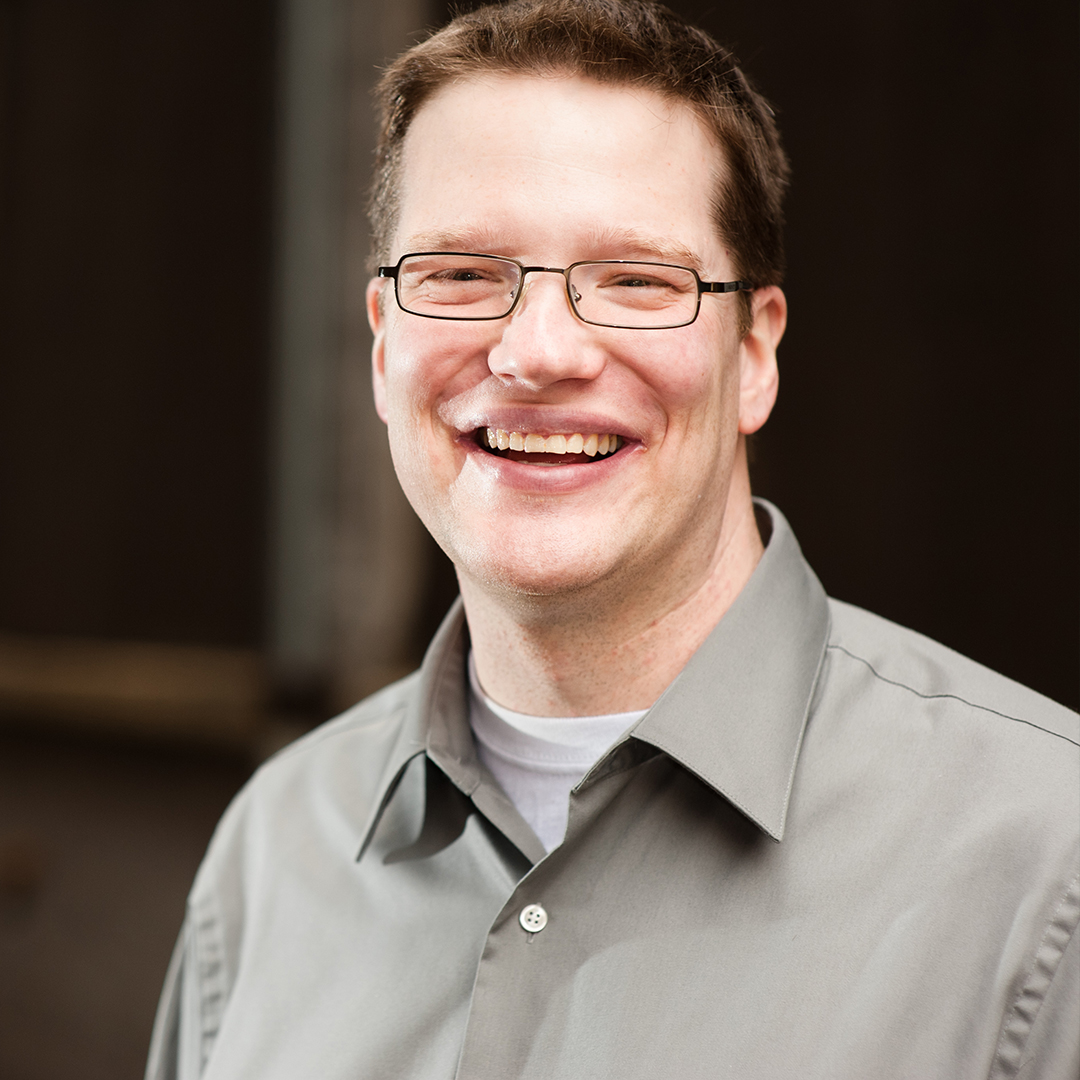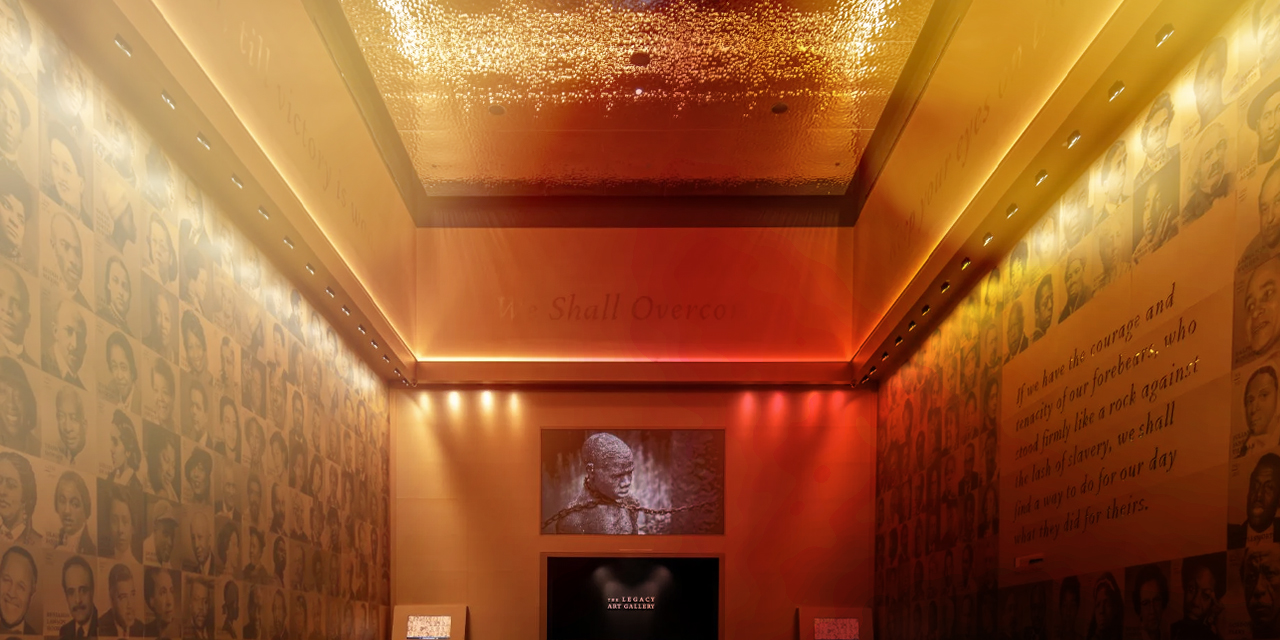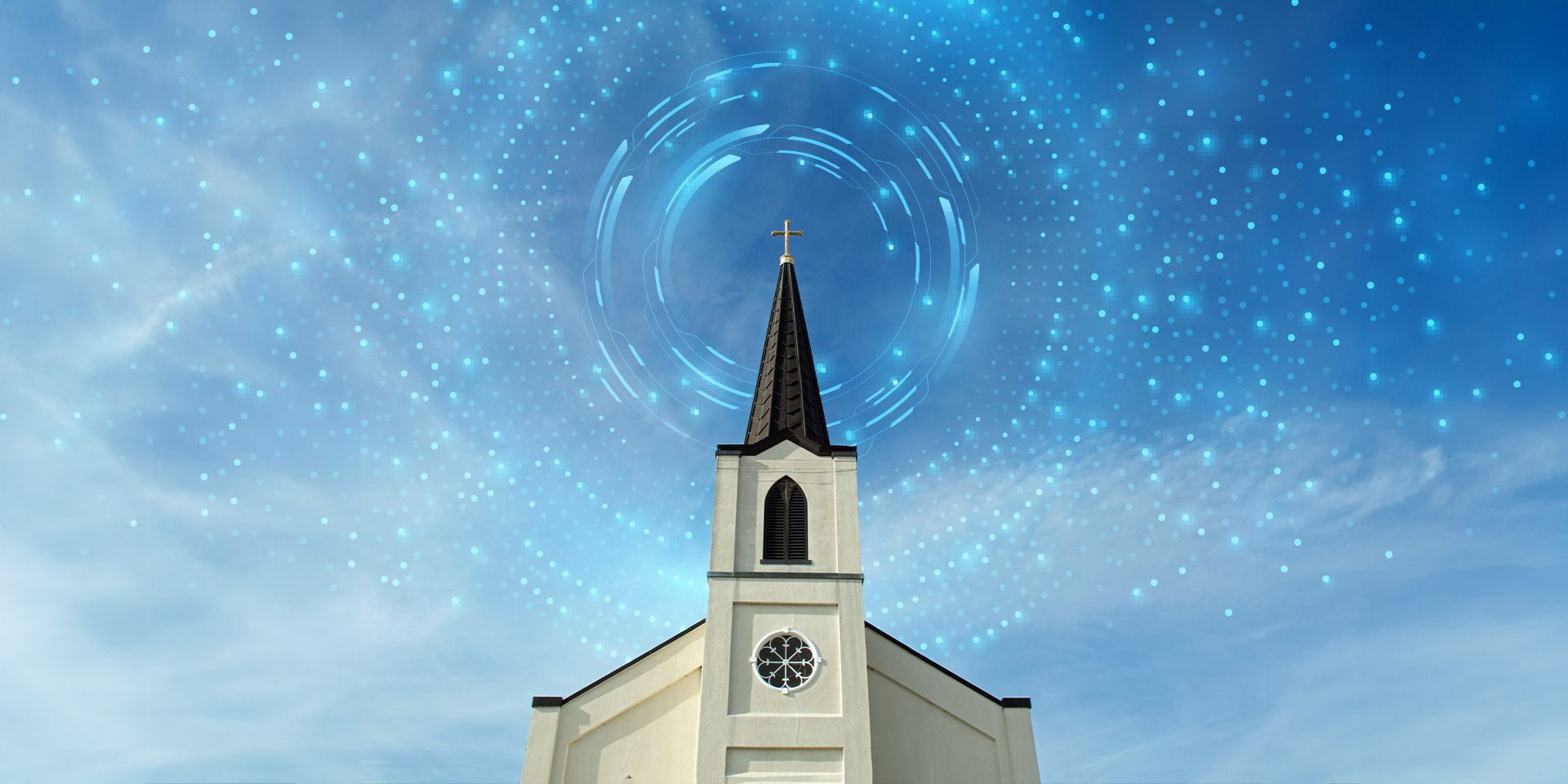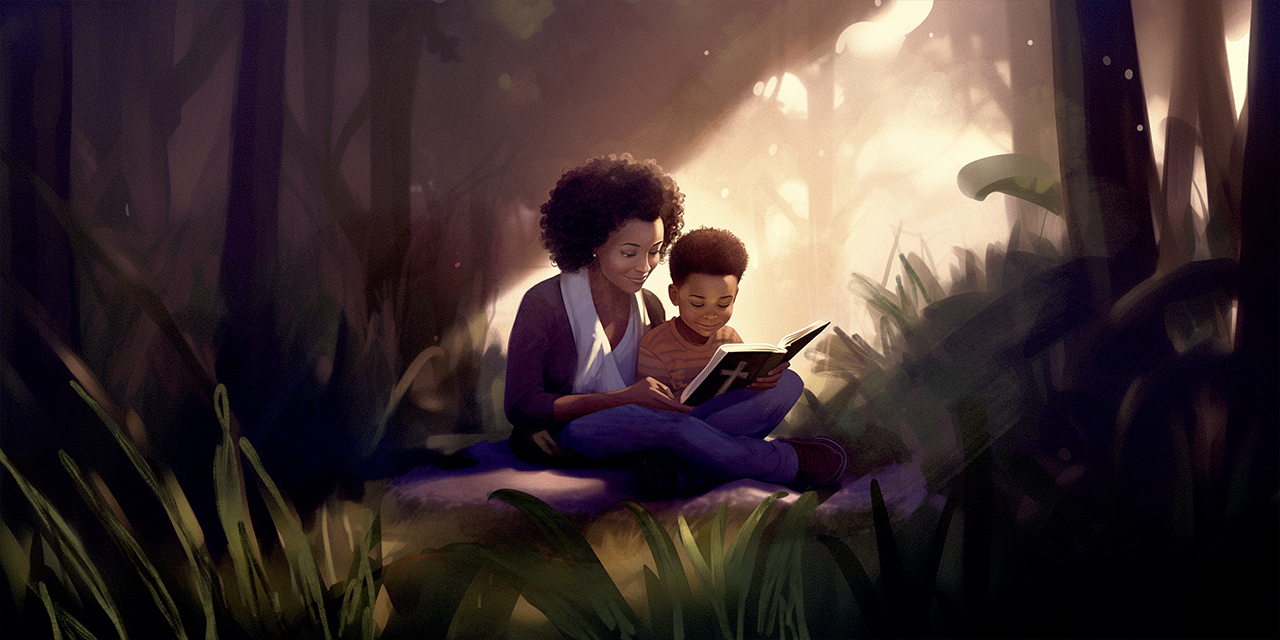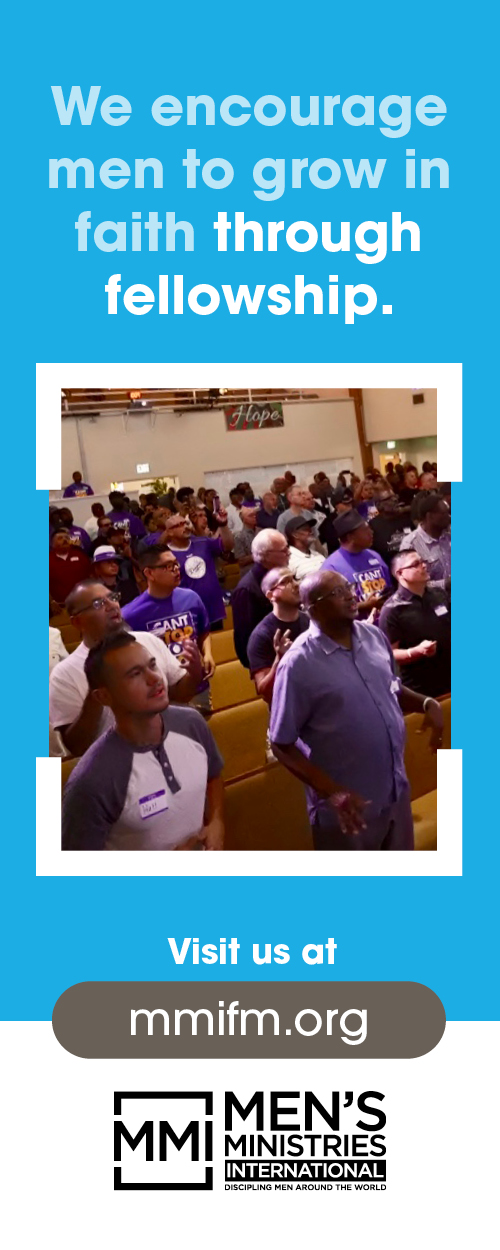The museum reveals the legacy of slavery in the United States through the use of interactive media, first-person narratives, art and interactive exhibits. The memorial is “dedicated to the legacy of Black Americans who were enslaved, terrorized by lynching, humiliated by racial segregation, and presumed guilty and dangerous,” according to its website.
_
“Very heavy and very hard to look at the different forms or formats of racism that persist in our country.” – Charles Latchison
_
Charles Latchison — the lead pastor of Light & Life West in Long Beach, California — said he had previously heard about the museum, but this was his first time to visit. He said he experienced a mix of emotions and found it to be “very heavy and very hard to look at the different forms or formats of racism that persist in our country.” He added that the museum “makes the case that … the biases that are seen in the corrections system are an extension of slavery.”
After touring the museum, “we left heavy … almost with: ‘Wow, so much has never changed.’” Then the leaders toured the memorial and realized, “So many people got away with it. There was no justice.” Latchison added, “I walked with most of my African American colleagues, and by the time we got back, we were too tired to really spend a lot of time hearing from the rest of the room.”
Latchison said the experience “was nothing to be happy about and nothing to rejoice about, but the light that I did take away — the gospel — is the Lord is present. Them being cut down the way they were is not forgotten, and it is a way to honor them.” He also received “a stronger conviction to make sure that I can educate and disciple as many young men and families as possible. I left more determined to do so. Even though I left depressed, the Holy Spirit did give me an inspiration to be more diligent about the work that I do as a Black pastor, a Black leader, a Black man.”
Shaken to the Core
Raisa Fabre — the senior pastor of Gracepoint Church in Chelmsford, Massachusetts, and a Free Methodist Church USA Board of Administration member — said her time in Montgomery “was truly a very moving and unforgettable experience. Visiting the Legacy Museum shook me to my core as I walked through mourning, lamenting and repenting. There was so much I thought I knew before visiting and realized there was so much more that I did not. As I visited both sites, I was very aware just how much we were all implicated in some way. That was my biggest takeaway — that none of us can claim innocence. … I pray in the present we can advocate for racial reconciliation and repent and understand, and seek to help others who are walking with us also repent and understand so we can do better today, tomorrow, together.”
_
“Weeks after this experience, I am still processing what my Black sisters and brothers endured and, in many cases, still suffer.” – Jimmy Ellison
_
Chris and Kaydi Hemberry — the lead pastors at Foothill Community Church in Oroville, California — wrote in an email that while walking out of the Legacy Museum, they “understood for the first time the thread of inequality woven through our nation, from the beginnings of American slavery to the modern-day challenges facing African Americans. We left many presuppositions at the exit doors and in their place brought home to our church a better language of mercy, real partnership, and advocacy.”
Jimmy Ellison, the senior pastor of Newnan City Church in Georgia, said, “The Legacy Museum and the National Memorial for Peace and Justice left me speechless. Weeks after this experience, I am still processing what my Black sisters and brothers endured and, in many cases, still suffer. Reading the names of those lynched in the counties where I was born and now pastor, I have a restored passion to make sure love-driven justice will be a legacy of the congregation I lead.”
Teaching and Modeling Christ
Refugio Sánchez, the lead pastor of Santa Ana FMC Lugar de Gracia y Amor and the assistant superintendent of Hispanic ministries for the Free Methodist Church in Southern California, said he has experienced mistreatment during his life — even from people of the same race, “but when you discover true slavery and what many people went through, you realize that what you went through is nothing in comparison.”
_
“As long as we continue with an emotionally damaged society, we will continue to experience wars of hate and discrimination.” – Refugio Sánchez
_
Sánchez said that the museum helped him understand the reasons why some groups hate each other and how “at the end of it all, both are slaves to their own ideologies. But when the two fronts meet their true freedom in Christ, things change for the good of both. As long as we continue with an emotionally damaged society, we will continue to experience wars of hate and discrimination. This is where God is calling the church (us) to bring emotional healing to the life of this society. As a church, we have a great responsibility. This responsibility lies in the implementation of justice and social well-being.
“But how can the church implement justice if we ignore the facts?” Sánchez added. “Learning is knowing, knowing is serving, and serving is implementing the love and justice of God in this society starting with our own families. Let us not ignore the facts — to ignore is to deny our responsibility to teach and model Christ.”
Zoe Hatcher — the lead pastor of Open Arms Church in Bradford, Pennsylvania — said she “was definitely broken over what I saw, but I was hurting for our African American brothers and sisters who were there and how hard that must have been for them.”
At the memorial, she was particularly impacted by “seeing that each pillar of names represented a county in America where lynchings took place, and that there were six acres of them. … I found the county I grew up in in Maryland, and there were three names.”
She found herself praying, “Lord, there is nothing we could ever do to fix this and make it right,” and asking God to bring “healing to the hearts of a broken people and a broken nation” while also “praying that we would have the same compassion to sit with our brothers and sisters of color and cry with them — and long for and work toward His kingdom manifesting here on earth as it is in heaven, bringing shalom to all people.”
_
“My heart sank as I viewed the images, read the stories, watched the videos, and looked into the abyss of evil and saw a human face staring back at me.” – Mike Chong Perkinson
_
Standing for Reconciliation
Mike Chong Perkinson, the lead pastor of The Lamb’s Fellowship Lake Elsinore and the director of multiplication for the Free Methodist Church in Southern California, said he felt “dismay, sadness and horror” as he journeyed through accounts of “absolute, inhumane mistreatment of human beings who happened to be a different color. I am of Asian descent and so I am familiar with being recognized, mocked and ridiculed for being different. But the injustice and cruelty I have experienced doesn’t compare to the atrocities and demonic injustice of slavery and racism in early America. My heart sank as I viewed the images, read the stories, watched the videos, and looked into the abyss of evil and saw a human face staring back at me.”
He was horrified by the thought that people did these things to other people for “personal gain and pleasure. I was appalled and wondered what I would have done if I were alive in those days. I would like to think I would have stood against all that was unjust and contend for righteousness as the prophet declares, ‘Let justice roll down like waters, and righteousness like an ever-flowing stream’ (Amos 5:24 ESV). Whether I would have stood then or not, I don’t know. What I do know is that I can and will stand today, and so I do on bended knee before my Father in humility praying that I live as the son He created me to be expressing His loving and righteous justice and treating every person as someone made in His image as I join my Father in the ministry of reconciliation.”
Christie Hurt — the co-lead pastor of The Well in Evansville, Indiana — said one of the most memorable experiences was “the long hallway in the museum, which starts with the transatlantic slave trade on to slavery, then to Reconstruction and civil rights, and ends with the present prison system. I read every word as I walked through the exhibit.”
_
“The only way to prevent injustice is through understanding.” – Christie Hurt
_
She looked up and saw people of different races and ages “intently reading the information and looking closely at all the pictures. I started wondering what everyone was thinking. Each person, no matter race or age, comes with his or her own story that forces one to see situations with different glasses. Our backgrounds shape our perceptions and our actions. The only way to prevent injustice is through understanding. The only way to understand what others are thinking is to listen. Sometimes we are so scared of asking the wrong questions, we never question anything. This was all going through my mind as I watched others taking in the exhibit.”
Since returning home, Hurt said she has “been thinking about ways in which I can make sure to listen to other people’s stories and try to understand their points of view as a way to seek justice and do my part in stopping things like this from happening again. I also have been reading suggested books, such as ‘Just Mercy’ and others, to educate myself on situations and viewpoints to which I have not been exposed.”
A Sacred Journey
Colleen Hurley-Bates, the lead pastor of the Free Methodist Church of Santa Barbara, said, “It felt like a sacred journey to walk through the Legacy Museum and recognize the overwhelming horror, sorrow, loss, and grief millions of enslaved Black people experienced over hundreds of years. To see lies which spawned this evil and the lies which continued to perpetuate the subjugation of others who were born with equal freedom and dignity God gives us all overwhelms the soul.” She saw “an obvious thread from slavery in our country to the mass incarceration of Black men and women (which the museum compellingly makes a case for), which points to the continued oppression of a whole group of people based on the color of their skin.”
_
“We cannot dismiss their stories or experiences for any reason.” – Colleen Hurley-Bates
_
Hurley-Bates reflected on “one particularly painful piece” about how “Reconstruction basically fell apart after the Civil War. Those tasked with providing now free people with a safe place to live, work, own land, vote, and thrive either actively changed the mechanism of slavery or simply turned their backs on those who were legitimately supposed to be free. Wide swaths of the church were complicit in this.”
A person cannot walk through the National Memorial for Peace and Justice’s “more than 800 steel monuments — designating every county in our nation where lynching occurred — and not feel visceral pain and sorrow. You imagine what each person went through and the terror it must have been to die that way,” Hurley-Bates said. “As Christians, we have to listen to our Black brothers and sisters, for whom this is personal. We cannot dismiss their stories or experiences for any reason. Their entire lives and all they have known in their families have been shaped —and continue to be shaped — by the effects of slavery.”
She sees “opportunities to be part of a new day as God’s people, if we will face the past with open eyes and allow God to meet us in the pain too many have borne for centuries. Lord, have mercy on us as people and may we as Free Methodists continue to seek reconciliation and fight the slavery that continues to rage in our world today.”
Love of Freedom
Fraser Venter, the FMCUSA’s strategic catalyst for love-driven justice, referenced a quote from Phillis Wheatley who was enslaved at the age of 7 in Boston. “In every human breast, God has implanted a principle, which we call love of freedom; it is impatient of oppression and pants for deliverance.”
_
“Will I be counted as one who in Christ will be counted among my courageous forebears to see the love of freedom become a freeing love?” – Fraser Venter
_
“Within moments of entering the Legacy Museum, you encounter this quote from Phillis Wheatley. Her words guided me through the museum’s experiential maze of racial inequity that has impacted not only our nation but our globe. Love for freedom is placed in the heart of all God’s children, but sadly, for 12 million Black enslaved persons transported through the transatlantic slave trade and the additional 2 million buried at sea, and many today who are still enslaved in systems of racism, this was and is the eerie reminder that we as Free Methodists must be forerunners and pioneers to see still the oppressed go free and to no longer pant for deliverance but breathe out the peace and the freedom God gives in voice and witness,” Venter said. “At the end of the tour, I found myself exhausted, sitting in the reflection room surrounded by a great cloud of civil rights leaders and pioneers — men and women from the past to present who have given voice and life for the sake of freedom.”
Venter said he thought, “Will I be counted as one who in Christ will be counted among my courageous forebears to see the love of freedom become a freeing love?”
He added, “Sadly, I did not see any of our Free Methodist family present in the hall [of civil rights leaders], and so I was personally challenged to reflect, ‘Will we, as Free Methodists in such a time as this, be impatient with oppression and pant for deliverance in our kingdom work and witness?’”
+
